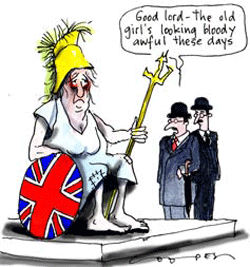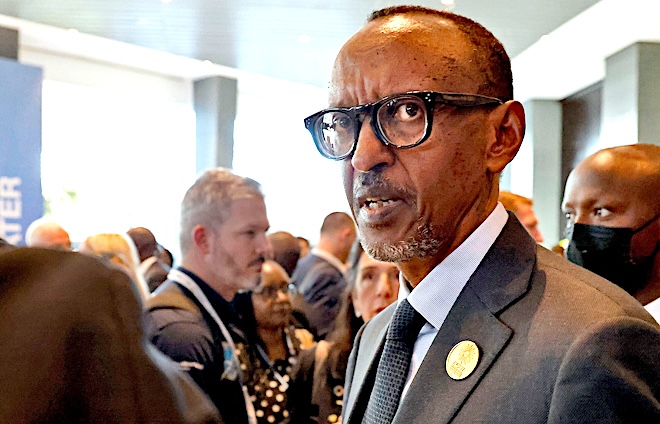News from Blighty
 London Calling •
London Calling •  Tuesday, February 27, 2024
Tuesday, February 27, 2024 Noises off render Assange hearing inaudible ... Image merchants throwing the copyright book at AI - Parliamentary Digital Committee reports ... Slow headway with costly plan to pack asylum seekers to spooky African regime ... Floyd Alexander-Hunt reports
 From London I've followed the headlines, social media posts and general hysteria surrounding the arrival Down Under of Taylor Swift.
From London I've followed the headlines, social media posts and general hysteria surrounding the arrival Down Under of Taylor Swift.
It's quite strange really. For the past seven months, I've felt at the epicentre of the common law world, where legal developments have ramifications elsewhere.
Yet now, I'm waiting with bated breath on the decisions made by Sydneysiders and Melbournians as to when I should take my bathroom break when I see Swift's Eras Tour a full four months later in Liverpool.
Unlike Swift's three-hour concert, this month's wrap is an easy five minutes taking you through February's political, technical and crazy eras of the UK.
Some technical issues
Julian Assange's bid for an appeal over his extradition to the United States was heard during a two day hearing in London beginning on February 20.
The Wikileaks man is accused of conspiracy to obtain and disclose national defence information after extensive documents were leaked in relation to the Afghanistan and Iraq wars.
Unfortunately for those watching the proceedings remotely, the Royal Courts of Justice experienced audio system failures so observers were unable to hear the opening arguments led by Ed Fitzgerald KC for Assange.
 Fitzgerald (right): inaudible for remote viewers
Fitzgerald (right): inaudible for remote viewers
Technical problems continued throughout the day with words muffled and drowned out by the noise of loud typing.
It was akin to watching the final season of Game of Thrones when the lighting was so low no one could actually make out what was going on.
On the second day of the trial, Dame Victoria Sharp mentioned the "technical problems" and noted "it is extremely regrettable and it is being investigated".
"The order we made that remote access should be granted to the many hundreds of people who wanted to observe this hearing was an important one.
"It had at its centre this court's commitment to transparency and open justice.
"If there are any further issues today affecting members of the press or the public in court or on a remote link, please do let us know so they can be looked at without delay."
Unfortunately, the technical issues continued. Remote observers complained that the audio cut out at the point James Lewis KC, lead counsel for the US government, begun addressing the reasons why Assange is unlikely to face the death penalty if extradited.
What was that? *Loud typing noises*
Copyright v AI
The House of Lords Communications and Digital Committee's report has called for the UK Government to provide "sufficient protections" for copyright holders whose work is being used to train AI without permission or compensation.
The report argues that the potential benefits of using Large Language Models (LLMs) do "not warrant the violation of copyright law or its underpinning principles". The committee's report said:
"The point of copyright is to reward creators for their efforts, prevent others from using works without permission, and incentivise innovation.
"The current legal framework is failing to ensure these outcomes occur and the government has a duty to act. It cannot sit on its hands for the next decade until sufficient case law has emerged."
Chairman of the Committee, Baroness Stowell, noted that the risks of AI should be tackled in a "proportionate and practical manner" so the UK is not left out "on a potential AI goldrush".
 Stowell: goldrush
Stowell: goldrush
I can only imagine the gold in this analogy is the capacity of AI to create Harry Styles' covers of Taylor Swift songs - could there be a greater use of such technology?
In the UK, Getty Images has sued Stability AI, an AI image generator, for infringing its intellectual property rights by using its images to train AI models.
In December, the UK High Court ruled that the case should proceed to trial.
Asylum seekers - where to next?
The UK Home Office has revealed that over 30,000 asylum seekers face potential deportation from the UK to Rwanda.
The confusingly named Illegal Migration Act criminalised asylum seekers arriving in the UK after July 20, 2023 and stated that they would be sent to their home country or a safe third country.
Home Secretary James Cleverly disclosed that since the Illegal Migration Act became law, 33,085 asylum seekers have arrived and will not have their claims assessed while the government takes steps to deport them to Rwanda.
Cleverly stated that the backlog of 94,000 cases should instead be referred to as a queue - which makes it sound so much more pleasant.
Enver Solomon, chief executive of the Refugee Council, emphasised that the government's plans "are causing huge distress to vulnerable people".
In 2022, the UK Government signed an agreement allowing for the deportation of asylum seekers to Rwanda.
 Paul Kagame, President of Rwanda: authoritarian
Paul Kagame, President of Rwanda: authoritarian
In December 2023, the Supreme Court ruled that the scheme was unlawful as Rwanda was not a safe country for asylum seekers who faced a real risk of being returned, directly or indirectly, to a country where their life or freedom was at stake.
In an attempt to side step the Supreme Court's ruling, the UK government introduced a new bill clarifying that Rwanda is a safe country under UK law.
The Bill was passed by the House of Commons on January 17, and is being debated in the Lords.
To date, the UK has paid the Rwandan government £240 million in an attempt to "stop the boats". It is expected that another £50 million will be paid in 2024 and an additional £100 million in 2025 and 2026.
So far, no asylum seekers have been sent to Rwanda. The Rwandan president, Paul Kagame, has offered to return the money if no asylum seekers are sent to his country.
While his money-back guarantee sounds more generous than Facebook Marketplace, the Rwanda plan comes with a pile of worries - including Kagame's proxy war in eastern Congo.
 AI,
AI,  Asylum seekers,
Asylum seekers,  Copyright,
Copyright,  Julian Assange
Julian Assange 









Reader Comments